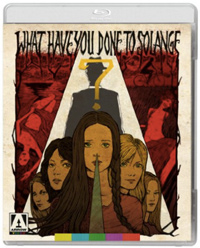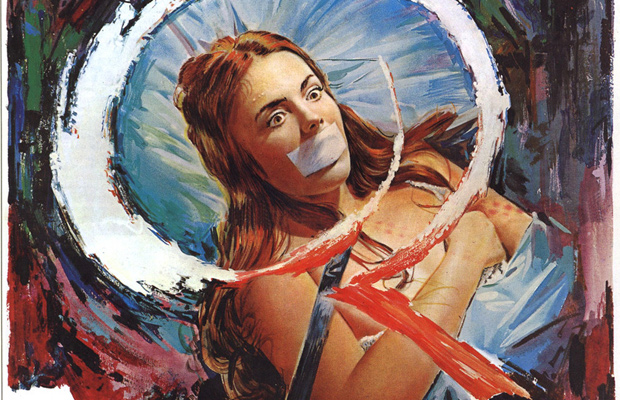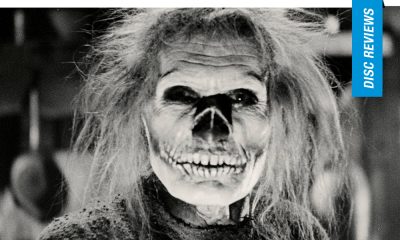Disc Reviews
What Have You Done to Solange? | Blu-ray Review
 Massimo Dallamano may be best known to some as the cinematographer of Sergio Leone’s A Fistful of Dollars (1964) and For a Few Dollars More (1965), credited under the pseudonym Jack Dalmas. Following his collaborations with Leone, Dallamano would only serve as cinematographer twice more (his last credit being French director Michel Deville’s 1966 comedy The Mona Lisa Has Been Stolen starring George Chakiris and Marina Vlady). The explosive popularity of the spaghetti western would allow Dallamano to begin his own career as a director, with 1967 debut Bandidos (credited under another pseudonym, Max Dillman), but he’d soon after turn to the bread and butter of more exploitative genre fare. The director of eleven features, up until his death in 1976, Dallamano’s enduring, fascinating masterpiece stands as the 1972 title What Have You Done to Solange? Credited as a giallo staple, Dallamano’s film is more of a hybrid of subgenres, a mixed giallo and poliziotteschi film.
Massimo Dallamano may be best known to some as the cinematographer of Sergio Leone’s A Fistful of Dollars (1964) and For a Few Dollars More (1965), credited under the pseudonym Jack Dalmas. Following his collaborations with Leone, Dallamano would only serve as cinematographer twice more (his last credit being French director Michel Deville’s 1966 comedy The Mona Lisa Has Been Stolen starring George Chakiris and Marina Vlady). The explosive popularity of the spaghetti western would allow Dallamano to begin his own career as a director, with 1967 debut Bandidos (credited under another pseudonym, Max Dillman), but he’d soon after turn to the bread and butter of more exploitative genre fare. The director of eleven features, up until his death in 1976, Dallamano’s enduring, fascinating masterpiece stands as the 1972 title What Have You Done to Solange? Credited as a giallo staple, Dallamano’s film is more of a hybrid of subgenres, a mixed giallo and poliziotteschi film.
A depraved killer has begun brutally killing the young women of St. Mary’s Catholic College in London. Unfortunately, the sole witness happens to be Elizabeth (Cristina Galbo), who caught a glimpse of a killing while she was canoodling with her married teacher Enrico Rosseni (Fabio Testi). Dressed as a priest, more women die, and a pattern emerges, with the police pressuring Rosseni into admitting what he knows after he mysteriously visits the initial crime scene. Matters are complicated since Rosseni’s wife Herta (Karin Baal) is also a member of the staff. Soon, it’s discovered the killings revolve around a secretive clique of girls and something having to do with an old friend of theirs named Solange.
With its titular character’s name not even uttered until seventy minutes into the running time, Dallamano’s film features a surprisingly compelling, unpredictable narrative thanks to the source novel The Clue of the New Pin from prolific English novelist Edgar Wallace (who died in 1932 and is best remembered as the writer of King Kong). Of course, Dallamano and co-writer Bruno Di Geronimo inject a bit of sleazy flavor to enhance the titillation factor, and a customary amount of nude, nubile women abound throughout. But its London locale also sets the title apart from a legion of Dallamano’s contemporaries, including a significant mixed cast starting wuth the Italian Fabio Testi, German actress Karin Baal, and then the American ingénue Camille Keaton as the half French school girl Solange.
Another vibrant, moody score from Ennio Morricone enhances this, particularly some late staged black and white sequences wherein the tragedy of Solange is revealed. Most surprising is how grisly the violence in the film is, even by today’s standards, with its killer’s trademark stabbing women in their genitals. Fans of lurid exploitation elements enhanced by social commentary should definitely appreciate where it all ends up, though the unapologetic misogyny is never really addressed.
Fabio Testi is an arresting screen presence, and Joe D’Amato’s camera tends to linger on him, outshining the frames he shares with Cristina Galbo or Karin Baal. It’s a wonder he isn’t better remembered today despite having appeared in the works of various European masters, such as Visconti’s The Garden of the Finzi-Continis (1970) or opposite Romy Schneider in Zulawski’s magnificent The Most Important Thing is to Love (1975). Genre hounds will note the presence of Camille Keaton in her first role, an actress who would eventually transform into an exploitation icon several years later as the lead in 1978’s I Spit on Your Grave.
Dallamano was fresh off a loose adaptation of Wilde’s Dorian Gray, the modernized London production starring Helmut Berger, but it seems Solange would set him off into more genre hybrids, following this up with the infamous Super Bitch (1973), which had several other equally ludicrous titles, such as Blue Movie Blackmail, Mafia Junction, or perhaps, most colorfully, the original matinee title, It May Be More Bastards, Eh Inspector Cliff? Fans of Solange should note it forms the first title in a loose motif of films referred to as the “Schoolgirls in Peril” trilogy with Dallamano’s 1974’s What Have They Done to Your Daughters, and Alberto Negrin’s 1978 Rings of Fear, also starring Testi. Dallamano would also notably direct The Exorcist inspired The Night Child (1975) starring Joanna Cassidy.
Disc Review:
Arrow presents the title with a brand new 2K restoration from the original camera negative in 2.35:1. The picture and sound quality (DTS-HD Mono 1.0) are both excellent, and both English and Italian language options are available. Fans of the title should be pleased to see a handful of interesting new bonus features.
What Have You Done to Decency? – A Conversation with Karin Baal:
A thirteen minute interview with actress Karin Baal, who doesn’t seem to hold the title in the highest regard.
First Action Hero:
A twenty one minute interview with Testi from Rome in 2006 is included, the actor speaking at length about his career and serving for eight years as a stuntman.
Old School Producer:
An eleven minute interview with producer Fulvio Lucisano from Rome in 2006 finds him relaying his experienced on this particular project with Dallamano.
Innocence Lost – Solange and the “Schoolgirls in Peril” Trilogy:
Michael Mackenzie explores themes across Solange and her two sister films following in the loosely related “Schoolgirls in Peril” trilogy. A visual essay produced exclusively for Arrow Video, the half hour feature is comprehensive but also contains spoilers.
Final Thoughts:
Giallo fans should rejoice with this beautiful remastering of this genre staple. Weird, engaging, and unpredictably entertaining, What Have You Done to Solange? is worth checking out.
Film: ★★★½/☆☆☆☆☆
Disc: ★★★★/☆☆☆☆☆

































